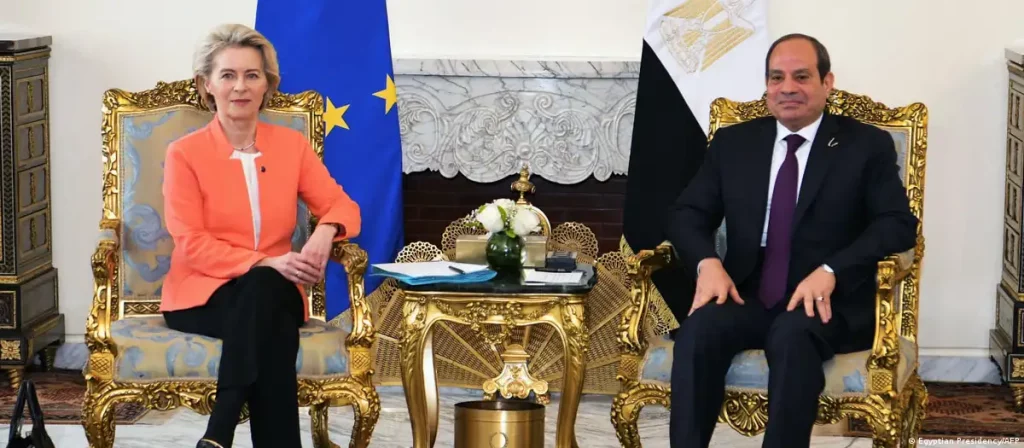The European Union has agreed to provide Egypt with a €7.4 billion ($8.06 billion) funding package from 2024 to 2027, aimed at stabilizing the country’s faltering economy and reducing its dependence on Russian gas. The deal, signed by European Commission President Ursula von der Leyen and Egyptian President Abdel Fattah el-Sissi in Cairo, also includes measures to curb migration flows from the region into Europe.
The funding package comprises €5 billion in macro-financial assistance, €1.8 billion in investments, and €600 million in grants over the next three years. The agreement elevates the EU’s relationship with Egypt to a “strategic partnership,” fostering cooperation in areas such as renewable energy, trade, and security.
Egypt’s strategic location and economic weight in a volatile region were cited as key factors behind the deal. “With Egypt’s political and economic weight and its strategic location in a very troubled neighborhood, the importance of our relations will only increase over time,” von der Leyen stated.
Egypt’s economy, heavily focused on costly infrastructure projects, has been hit hard by recent economic shocks, including the ongoing conflict in Gaza, which has impacted vital sectors like tourism and shipping through the Suez Canal. Earlier this month, the International Monetary Fund (IMF) approved an $8 billion loan package for Egypt after the country implemented economic reforms.
European governments have long been concerned about the risk of instability in Egypt, where economic adversity has driven increasing numbers to migrate. The deal includes measures to enhance border protection, particularly along Egypt’s southern border with Sudan, and counter-terrorism cooperation.
Italian Prime Minister Giorgia Meloni and Greek Prime Minister Kyriakos Mitsotakis, whose countries are at the forefront of receiving migrants to Europe, accompanied von der Leyen on the Cairo trip. Greece, in particular, is grappling with a surge in arrivals of Egyptian migrants via a new refugee route from Libya.
However, the agreement has drawn criticism from human rights groups like Human Rights Watch, which condemned the EU’s “cash-for-migration-control approach” as enabling authoritarianism and betraying human rights defenders and activists in Egypt.
As the EU seeks to bolster its strategic partnerships and address migration challenges, the funding deal with Egypt underscores the bloc’s willingness to provide substantial financial aid in exchange for cooperation on border control and economic stability in the region.


